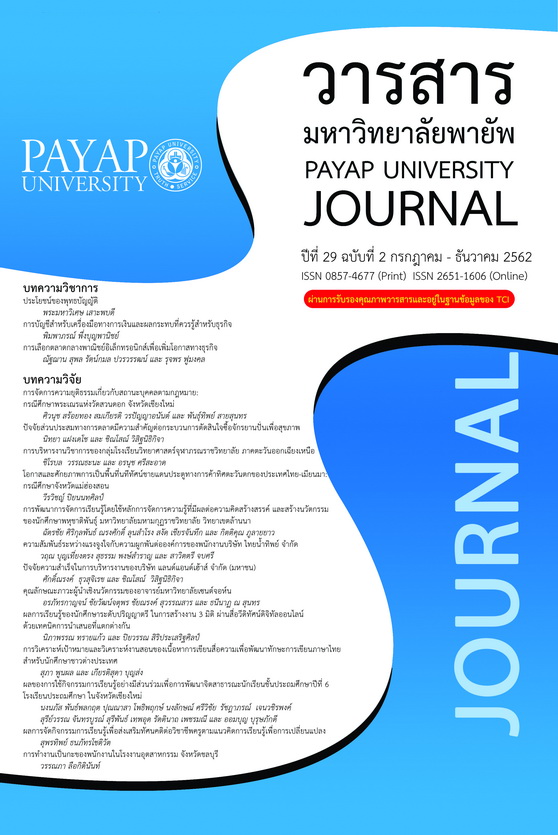ประโยชน์ของพุทธบัญญัติ
Main Article Content
บทคัดย่อ
หลักการของนิติบัญญัติที่ปรากฏในพระไตรปิฎก เป็นหลักการแห่งสิกขาบทของพระภิกษุสงฆ์ เป็นกฎระเบียบสำหรับควบคุมความประพฤติทางกาย และวาจาของพระภิกษุสงฆ์ให้เรียบร้อย พระสงฆ์ที่รักษาสิกขาบทดี ปฏิบัติดี ปฏิบัติชอบ จะไม่เกิดความเดือดร้อนใจ ได้รับความแช่มชื่น รู้สึกว่าตนประพฤติดีงามแล้ว ไม่ถูกจับกุมลงโทษ จะเข้าหาสมาคมกับภิกษุอื่นใด อาจหาญไม่สะทกสะท้าน สอดคล้องกับแนวคิดที่ว่า กฎหมายหรือกฎระเบียบต่าง ๆ เกิดขึ้นเพื่อแก้ปัญหาสังคม เกิดขึ้นเพื่อปราบปรามคนพาลอภิบาลคนดี เป็นกรอบให้คนในสังคมปฏิบัติตาม การบังเกิดขึ้นของพุทธบัญญัติต่าง ๆ ของพระสงฆ์ ซึ่งมีลักษณะเดียวกันกับกฎหมายทั่วไปของโลกสากล อันเป็นกฎที่ควบคุมพฤติกรรมของประชาชนในสังคม
Article Details
รูปแบบการอ้างอิง
เสาะพบดี พ. (2020). ประโยชน์ของพุทธบัญญัติ. วารสารมหาวิทยาลัยพายัพ, 29(2), 1–6. https://doi.org/10.14456/pyuj.2019.15
ประเภทบทความ
บทความวิชาการ
เอกสารอ้างอิง
กองวิชาการ. (2551). สรรพศาสตร์ในพระไตรปิฎก. ปทุมธานี: มหาวิทยาลัยธรรมกาย แคลิฟอร์เนีย.
คณาจารย์แห่งโรงพิมพ์เลี่ยงเชียง. (2550). นักธรรมตรี ฉบับรวมเล่ม. กรุงเทพฯ: โรงพิมพ์เลี่ยงเชียง.
คมสัน โพธิ์คง. (2556). “พัฒนาการสำนักความคิดทางกฎหมาย” เอกสารประกอบการสอนชุดวิชา ความรู้เบื้องต้นเกี่ยวกับกฎหมายทั่วไป. นนทบุรี: มหาวิทยาลัยสุโขทัยธรรมาธิราช.
นัยนา เกิดวิชัย. (2543). ความรู้เบื้องต้นเกี่ยวกับกฎหมาย (พิมพ์ครั้งที่ 4). นครปฐม: นิตินัย.
ภูมิชัย สุวรรณดี และคณะ. (2545). ความรู้เบื้องต้นเกี่ยวกับกฎหมายทั่วไป. กรุงเทพฯ: นิติธรรม.
รัฐธรรมนูญแห่งราชอาณาจักรไทย พ.ศ. 2560. (2560, 6 เมษายน). ราชกิจจานุเบกษา. เล่ม 134 ตอนที่ 40 ก. หน้า 15.
ระเบียบสำนักนายกรัฐมนตรี เรื่อง การพัฒนาคุณภาพชีวิตระดับพื้นที่ พ.ศ. 2561. (2561, 9 มีนาคม). ราชกิจจานุเบกษา. เล่ม 135 ตอนพิเศษ 54 ง. หน้า 15.
สุทธิชัย ปัญญโรจน์. (2560). กฎหมายในชีวิตประจำวัน, http://oknation.nationtv.tv/blog/markandtony
คณาจารย์แห่งโรงพิมพ์เลี่ยงเชียง. (2550). นักธรรมตรี ฉบับรวมเล่ม. กรุงเทพฯ: โรงพิมพ์เลี่ยงเชียง.
คมสัน โพธิ์คง. (2556). “พัฒนาการสำนักความคิดทางกฎหมาย” เอกสารประกอบการสอนชุดวิชา ความรู้เบื้องต้นเกี่ยวกับกฎหมายทั่วไป. นนทบุรี: มหาวิทยาลัยสุโขทัยธรรมาธิราช.
นัยนา เกิดวิชัย. (2543). ความรู้เบื้องต้นเกี่ยวกับกฎหมาย (พิมพ์ครั้งที่ 4). นครปฐม: นิตินัย.
ภูมิชัย สุวรรณดี และคณะ. (2545). ความรู้เบื้องต้นเกี่ยวกับกฎหมายทั่วไป. กรุงเทพฯ: นิติธรรม.
รัฐธรรมนูญแห่งราชอาณาจักรไทย พ.ศ. 2560. (2560, 6 เมษายน). ราชกิจจานุเบกษา. เล่ม 134 ตอนที่ 40 ก. หน้า 15.
ระเบียบสำนักนายกรัฐมนตรี เรื่อง การพัฒนาคุณภาพชีวิตระดับพื้นที่ พ.ศ. 2561. (2561, 9 มีนาคม). ราชกิจจานุเบกษา. เล่ม 135 ตอนพิเศษ 54 ง. หน้า 15.
สุทธิชัย ปัญญโรจน์. (2560). กฎหมายในชีวิตประจำวัน, http://oknation.nationtv.tv/blog/markandtony


